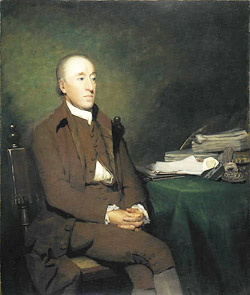
James Hutton |
Law of Uniformitarianism
Piecing together a glimpse of Earth’s long history and developing the principles of relative dating was like the work of a great detective. Scientists had to look for clues left in sedimentary rocks and use deductive reasoning to develop their understanding of geologic time. Eventually some fundamental laws of geology emerged that helped early researchers decipher clues from the past.
The most basic of these laws is the law of uniformitarianism, which was first proposed by the Scottish scientist James Hutton (1726-1797). Uniformitarianism is not unique to geology, but is a fundamental assumption of scientific inquiry. It states that the laws of nature do not change with time. Under uniformitarianism, we assume that the chemical and physical laws operating today have operated throughout all of time. This allows us to assume that the processes that create Earth materials and structures today are the same processes that did so in the past.
Uniformitarianism implies that if river sediments make sedimentary rocks today, then they did so in the past; that if erosion wears down Earth materials today, then it did so in the past; and that both of these processes took place in the past at the same rate at which they do today.